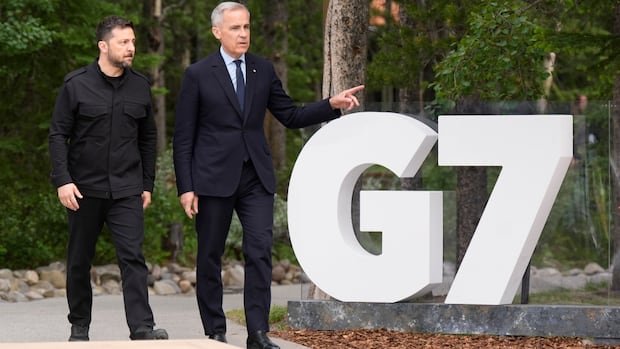Officials in Prime Minister Mark Carney’s office are retracting comments that the U.S. wanted to water down a statement about Russia’s war in Ukraine on the final day of the G7 summit in Alberta.
Following the G7’s closing remarks on Tuesday evening, Prime Minister Carney was questioned about the absence of a joint statement on Ukraine. He said the leaders concentrated on a declaration regarding the ‘exceptionally fast-moving situation in Iran,” but sidestepped questions about whether the absence of a Ukraine statement was due to a disagreement with the U.S. about language regarding Russia’s invasion. Carney’s chair summary did include language about Ukraine.
Tuesday afternoon, an official from the Prime Minister’s Office told reporters from multiple outlets that a joint statement was being discussed on Ukraine, but ultimately wasn’t going ahead because the U.S. wouldn’t agree to the final wording.
The official, who spoke on the condition they not be named, said the Americans did not want some of the pointed remarks about Russia to be included in the joint statement because they feared it would compromise negotiations with that country over ending their war.
That led to a unusual closing press conference where reporters sought clarity from Carney about what happened to scuttle the statement.
Carney, as host, said he did release a chair statement which “expressed support for President [Donald] Trump’s efforts to achieve a just and lasting peace in Ukraine” and “recognized that Ukraine has committed to an unconditional ceasefire, and they agreed that Russia must do the same.” He said all seven leaders agreed to that wording.
And the prime minister said Canada would have been prepared to go further in its official language on Ukraine than what ended up on paper.
“There would be things some of us, Canada included, would say above and beyond what was said in the chair summary,” he said after being peppered by repeated questions about the lack of a joint statement.
“But the recognition of the importance of the initiative of President Trump to achieve a lasting peace absolutely agree that we are resolute in pursuing all options to maximize pressure on Russia, including financial sanctions.”
Two hours later, a Carney spokesperson said there was never a plan for a joint statement. Emily Williams wrote that “Canada’s intention was always for the important language to be a part of the G7 chairs’ summary statement, and it was.”
The backpedalling is a sign of how sensitive dealing with Trump can be. And it comes on the same day Ukrainian President Volodymyr Zelenskyy spoke at the high-level meeting in Kananaskis, Alta., where he called for a peace deal.
Sources with the Ukrainian delegation told CBC News Zelenskyy cut his visit to Canada short, following a deadly bombardment on the Ukrainian capital overnight and U.S. President Donald Trump’s decision to skip Tuesday’s program.
Trump left Monday night, citing the Middle East conflict.
Trump met with his National Security Council in Washington on Tuesday to discuss the war between Israel and Iran.
The source said Zelenskyy will head back to Kyiv after talks in Kananaskis wrap up. He has cancelled a news conference planned in Calgary.
Carney also cited the escalating situation in Iran, which the G7 issued a joint statement about Monday evening, as another reason he held Ukraine comments for his chair summary.
It called for a “de-escalation” of hostilities in the Middle East. It affirms Israel’s right to defend itself and recognizes Iran as “the principal source of regional instability and terror” but also calls for some sort of “resolution.”
“We urge that the resolution of the Iranian crisis leads to a broader de-escalation of hostilities in the Middle East, including a ceasefire in Gaza,” read the statement, made public after Monday’s working dinner.
Prime Minister Mark Carney has announced a series of new measures to support Ukraine — including what the Prime Minister’s Office is billing as a new attempt to target ‘Russia’s shadow fleet and energy revenues’ with sanctions.
The G7 — made up of Canada, France, Germany, Italy, Japan, the U.K. and the U.S. along with the European Union — did find consensus on some items, mirroring the list of priorities Carney had already laid out before the leaders’ helicopters touched down in the Canadian Rockies on Sunday.
They include the Kananaskis Wildfire Charter and statements on transnational repression, countering migrant smuggling, artificial intelligence and a promise to collaborate on quantum technology.
There’s a lengthy G7 critical minerals action plan to secure critical minerals supply chains to stockpile the material needed for defence and technology such as germanium, gallium and graphite.
Canada could benefit given how many of those minerals can be found in this country.
The wildfire charter is also close to Canada’s interests, following back-to-back wildfire seasons. In an effort to more quickly snuff out fires around the world, the group agreed to “enhance interoperability” so firefighting equipment from one country can be used in others, along with other commitments. The goal is for firefighters to be more easily deployed where the need is greatest.


